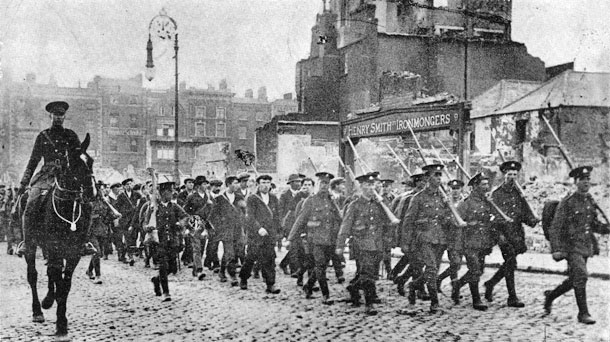17 July 2015
Comment . . . Greece 2015 – Echoes of Ireland 1916

● Republican fighters after the Rising – beaten but not broken
“When I was a child of ten, I went on my bare knees by my bedside one night and promised God that I should devote my life to an effort to free my country. I have kept the promise. I have helped to organise, to train, and to discipline my fellow countrymen to the sole end that, when the time came, they might fight for Irish freedom.
“The time, as it seemed to me, did come, and we went into the fight. I am glad that we did. We seem to have lost; but we have not lost. To refuse to fight would have been to lose; to fight is to win.”
THESE were the words of Pádraig Pearse, President of the Provisional Government of Ireland and Commander of the Irish Volunteers, at his court-martial almost a century ago. As we edge closer to commemorating and celebrating the 100th anniversary of the 1916 Rising, these words echo eerily across Europe and in particular Greece today.
The men and women of 1916 knew they were facing the might of the most powerful empire on the planet at the time. They knew the odds against them were enormous and their chances of success were negligible. But that did not deter them. Today, we celebrate their courage and tenacity and for offering a vision of what could be in their Proclamation.
When the rebels surrendered unconditionally, in an effort to prevent greater civilian casualties, the British authorities and their allies in Ireland celebrated a great victory. They paraded captured prisoners through hostile streets; the Establishment media mocked the rebel leaders and demanded retribution.
Given their actions and words of the last week, it would be easy to conclude that had Taoiseach Enda Kenny, Finance Minister Michael Noonan and Tánaiste Joan Burton been around at the time, they would have been part of the sycophantic chorus of approval for the harsh actions of the British Empire.
From any objective viewpoint, the 1916 Rising was a military failure that ended in the rebels having to surrender to far more powerful forces pitted against them to prevent suffering for citizens.
History, however, would show that it was a hollow victory for the British.
The Greek Government of the last week has sought to minimise civilian causalities – to keep crucial food and medical supplies flowing amongst other things. In doing so it has been compelled to surrender much. It has been mocked and jeered at by its powerful colonial opponents and – unfortunately – by erstwhile supporters who seemed to want them to fight to the death, whatever the consequences.
The last five days, five weeks, five months or five years (wherever you want to begin your clock in relation to the Greek crisis) has shone a light on a dark, sinister, less-than-benign ruling elite at the centre of Europe.
They are undemocratic. They are morally bankrupt and financially corrupt. They do not serve the interests of the ordinary people of any of Europe’s nation states – they serve the elites, what we in Ireland call the Golden Circles.
Above all, it has exposed them as people prepared to slaughter and destroy some of the very people they claim to represent to keep all others in check.
After the collapse of the Rising, the men and women of 1916 regrouped. Luckily, most had lived to fight another day. Their determination did not waver. They didn’t meekly walk away. Having learned the harsh lessons of Easter Week, they quickly began to once again chip away at their colonial masters' grip. They adopted different strategies and tactics until such a time as they forced the loosening of that grip.
The lesson for Greece and the SYRIZA Government after its five months of fighting against the odds is that, while it may seem to have lost, it did not lose. To refuse to fight would have been to lose. It chose to fight and, as Pádraig Pearse said: “To fight is to win.”
Their actions and deeds have opened the eyes of many across Europe. They have offered a vision of what could be. Don’t give up. Regroup. Adapt and quickly begin the process of chipping away again. The struggle goes on.
Follow us on Facebook
An Phoblacht on Twitter
Uncomfortable Conversations

An initiative for dialogue
for reconciliation
— — — — — — —
Contributions from key figures in the churches, academia and wider civic society as well as senior republican figures




